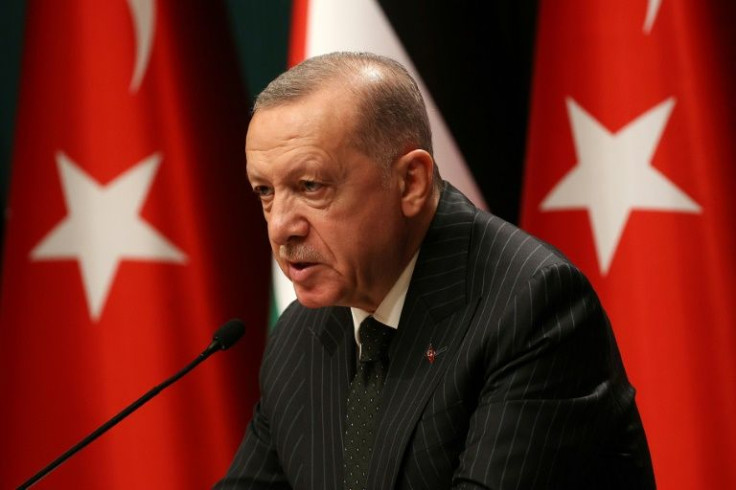Erdogan Emerges A Grand Statesman At The Cost Of West

When it comes to the war in Ukraine, Turkish President Recep Tayyip Erdoğan claims to be a pacifist working for world peace. But when it comes to its historic rival Greece, he sings a different tune.
Turkey is facing a deepening economic crisis at home and Erdogan is using improved trade ties with Russia and potential Russian aid to help contain the domestic crisis. President Erdogan feels that Turkey can afford to bypass Western sanctions as it is the only mediator available between the warring sides as of now.
Turkey, a vital NATO nation, holds the rare distinction of holding talks with both Russians and Ukrainians because of its President Erdogan's shuttle diplomacy and deft balancing act. Because Erdogan capitalized on Turkey's ties with both Kyiv and Moscow, no questions were asked from western capitals when he issued threats to Greece, its uneasy NATO neighbor.
Turkey has a long-standing sea and air boundary feud with Greece which leads to air force patrols and interception missions near Turkey's coastline. The historical rivals have been at odds over the status of Aegean islands and hydrocarbon resources in the Mediterranean. Turkey has accused Greece of arming the demilitarized Aegean islands and Erdogan has called on Greece to "not forget Izmir", referring to the Turkish victory.
"Hey Greece, take a look at history. If you go further, you will pay a heavy price," Erdogan told a rally in the Black Sea region on Sep. 3.
After the war in Eastern Europe started on Feb. 24, Erdogan placed Turkey as an honest and neutral power broker that can force both Russia and Ukraine to fall in line. In fact, he actually scored a big success in brokering the Ukrainian grain deal. Exports of grain from Black Sea ports started after Russia signed a deal with Ukraine in July, with the U.N. and Turkey acting as guarantors.
Since grains from Ukraine, Europe's bread basket, were important for western nations, they applauded him, despite many seeing him facilitating Russia to evade the Western sanctions for its Ukraine invasion.
Sixty-eight-year-old Erdogan went a step further on Sept. 3 by telling Russian President Vladimir Putin "that Turkey can play a facilitator role in the Russian occupied Zaporizhzhia nuclear power plant, as it did in the grain deal."
The offer came before the global atomic energy watchdog said that the Zaporizhzhia facility, the largest nuclear plant in Europe, had been disconnected from its main power line and was now relying on a reserve line.
Erdogan, who is facing polls next year, has no qualms in exploiting the war in Ukraine to shore up his country's tottering economy.
The Turkish president has repeatedly stated that he would not abide by the Western sanctions on Russia, and Turkey is the only NATO country that has not closed its airspace to Russian aircraft. Nearly 80 daily flights service between Russia and Turkey, which attracted about 2.2 million Russian tourists this year.
Erdogan also allowed four Russian oligarchs, with links to President Putin, to dock their yachts in Turkish ports and avoid the efforts to freeze their assets in superyachts by western nations.
Two of them- the $ 700 million Eclipse and the $ 600 million Solaris -- belong to Chelsea Football Club Owner Roman Abramovich.
During the standoff in Eastern Europe, Turkey has increased its trade ties with Russia, with which Turkey has strong commercial and military ties, including on energy. Moscow is currently funding Turkey's first nuclear plant, costing $20 billion. Turkish exports to Russia increased by 60 percent in dollar terms compared with the previous year.
Turkey has also acted as a go-between to assist Western firms, constrained by sanctions, to conduct exports to Russia. It has also introduced Russia's Mir card system in Turkish banks to attract an influx of cash and investment without any conditionality from Russia.
As Turkish banks are helping Russian government and businesses to bypass the sanctions, the U.S. has threatened to impose curbs on them. In a visit to Ankara and Istanbul in June, U.S. Deputy Secretary of the Treasury Wally Adeyemo warned against using broader cooperation with Russia to support Turkey's ailing economy in the runup to next year's polls. Turkey is already facing U.S. sanctions for acquiring S-400 missile system from Russia and the U.S. has withheld the sale of F-16 fighter jets to Ankara.
Turkey has always maintained its relations with Russia and the West on different levels. But there is a reason behind Erdogan's risky game and muscle flexing.
Erdogan is trying to ward off a recession caused by mountainous debt, steep losses in the value of the currency lira, and rising inflation with Russian investments.
The value of the lira has nose-dived in recent weeks and on Aug. 18 lira slid 0.9 percent against the dollar after Turkey's central bank shocked markets with a cut to its benchmark policy rate.
Inflation increased by an eye-watering 79.6 percent year over year, its highest in 24 years, in July as the country grapples with soaring food and power costs. Its trade deficit reached a monthly average of $8 billion this year. The country has to pay back a total of $182.4 billion of debt in hard currencies in the next year.
With these challenges at the homefront and polls next year, Erdogan, who has ruled Turkey for 18 years, is brushing up his image as a grand statesman.





